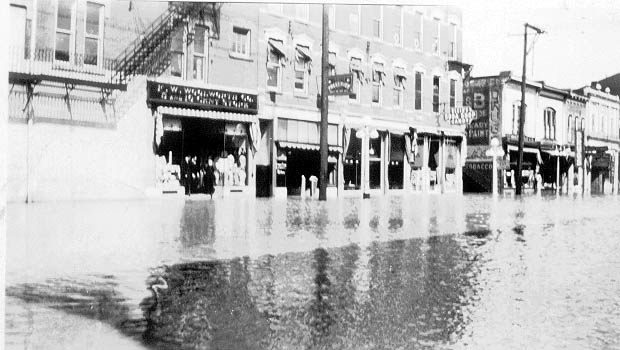Ironton Register, Jan 28, 1937
Ironton, Ohio 1937 Flood
Rain, incessant, fearful, appalling rain of a weeks duration enveloping the Ohio River watershed, assembled all the destructive forces that are embodied in the word “flood” and sent them hurtling down the Ohio Valley, laying waste a fertile stretch after rain that extended from Pittsburgh to Cairo and thence down the Mississippi. The flood eclipsed the record of the 1913 deluge by five feet, caused monetary damage that is now inestimable, and claimed many lives.
The onrushing tide covered the city of Ironton, and only about ten percent of the entire area was left untouched by the ochre solution. Not a single person in the entire valley was left untouched by the effects of the extending catastrophe. The toll of these angry waters has not been fully levied even though the crest has been reached and recession has been noted.
In the wake of the chaotic disturbance will come the horsemen of the Apocalypse who are astride the scourges of Pestilence, Famine, and Disease.
There is not a single soul in the entire reach of the Ohio Valley who could have predicted the terrific, ever-rising rush of the maddened tide. Certainly, none among us would have ventured to presage a stage that would exceed the 1913 forage of the mighty river, that then lad waste its fertile valleys, causing millions upon millions of dollars of damage and levying a heavy toll of lives.
The river observers had held fast to the belief that a snow deposit in the Pennsylvania and West Virginia mountain chain was necessary for a flood of major proportions in lower Ohio. The forces of nature blasted this belief and this conclusion in this Year of our Lord.
A drenching, driving rain that continued day after hour, day after day, and stretching on into a solid week furnished Ohio and its tributaries with a mountainous stream of water. It rushed into every lowland section, engulfing each like a tidal wave, forcing the inhabitants into the higher and more habitable regions, laying waste their homes and ravaging their possession.
The residents of Ironton, with the usual blithesome, lighthearted spirit, greeted the first rush of the water. Only when the river threatened to leave its banks did the merchants move their stocks off the floors of their establishments. Then the merchants allowed only for the stage that, some unusual times, caused them inconvenience and some little loss.
Not one of them was prepared for the incessantly grasping push, and the number who were about to remove their goods from the path of the destructive force was almost negligible. Consequently, the financial loss to the city of Ironton will mount many hundreds of dollars beyond the property loss of the 1913 debacle.


0 Comments